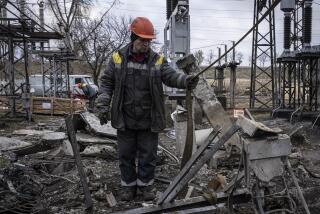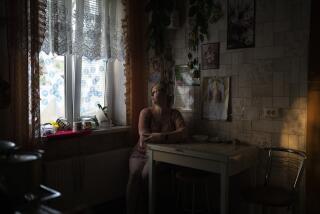Break in Clouds Can Give Allies Clear View of Targets
- Share via
PRISTINA, Yugoslavia — The muezzins’ calls were silenced and the mosques closed to Friday prayers, but a bright spring sun broke through the stubborn clouds, bringing hope, however weak, to Kosovo’s ethnic Albanians.
The first sign of better weather came Friday morning. Then, at 10:50 a.m., a loud explosion on the outskirts of Pristina announced NATO’s first daylight bombing within earshot of Kosovo’s capital.
An hour later, the clouds had closed in again and the sky over Pristina was a depressing gray until the sun set and the electricity went out, and, once again, everything was black. But the weekend could see blue skies over Kosovo.
Since the North Atlantic Treaty Organization began its airstrikes against Yugoslavia, the Balkans’ bad weather has been Yugoslav President Slobodan Milosevic’s best defense.
Day after day at NATO’s military briefings in Brussels, the alliance complains that it had to cancel several bombing missions because of the cloud cover over Kosovo.
It’s one of the few things NATO could have predicted in its war with Yugoslavia, and many here keep asking why history’s most powerful military alliance couldn’t have waited for better weather.
Milosevic’s forces were burning and shelling villages in the days before NATO airstrikes began, but the Serbian offensive was still limited compared with last summer’s fighting in Kosovo, which the world did little to stop.
By launching its airstrikes March 24, NATO gave Milosevic the excuse he wanted to expand a ruthless drive to clear Kosovo of several hundred thousand ethnic Albanians, in just the right weather to cover his forces.
That is about to change, if the sky begins to clear as expected over the weekend and NATO starts going after more tanks and troops with better-armed, low-flying aircraft such as the U.S. A-10 “Warthog,” the alliance said Friday.
“The weather in the Balkans is forecast to improve soon, and this ought to strike fear in all of Milosevic’s forces, particularly those carrying out the repression in Kosovo,” British Air Marshal John Day warned gravely in London.
But NATO has been saying that for days now, and its attacks on mainly fixed targets such as airports, communications and radar sites, or fuel and ammunition dumps, have done nothing to slow the mass expulsion of Kosovo Albanians from the province.
Kosovo’s bad weather also has allowed Milosevic to disperse and hide some of his armor, troops and commanders, in some cases either in or near civilian buildings that NATO can’t risk hitting.
In the center of Pristina, a large armored vehicle with a double-barreled antiaircraft gun mounted on it is parked in the shadow of a five-story apartment building near the defense headquarters.
Serbian authorities claim that NATO hit an unspecified civilian target in an attack northwest of Pristina on Friday morning. According to the Serbs, the blast came from a cluster bomb, a weapon that breaks up into smaller bombs, which the Serbs called a violation of international law.
They identified the target as “civilian and military facilities” at Stari Trg, near the northwestern city of Kosovska Mitrovica, one area where Milosevic launched his scorched-earth offensive more than two weeks ago.
In Pristina, the rapidly shrinking ethnic Albanian community did the little it could to protect itself against roaming Serbian gunmen and security forces.
Contrary to reports from outside Kosovo, not all of the provincial capital’s ethnic Albanians have given in to the threats and left, even though they know the masked gunmen might come to their doors next.
On the eastern edge of central Pristina, ethnic Albanians pushed a disabled car across a narrow side street, hoping to block police, soldiers and paramilitary forces from reaching the road from a main street.
A pair of thugs, wearing green camouflage fatigues and green woolen hats, simply entered by a different route in a battered old Yugo. They stopped two Kosovo Albanian women in their late teens and demanded their identity cards.
The thugs were looking for someone, but not them, and so the women were allowed to go. But five minutes later, the car appeared again, from a different direction. The Serbs were circling, on the hunt.
Around the corner, someone had put up a 13-rung ladder made of tree limbs to close off another entrance. It was a pathetic attempt at self-defense against the Serbian armor and stolen cars filled with paramilitary forces that cruise the capital.
But it is all Pristina’s ethnic Albanians have left.
At the provincial capital’s train station, the platform was empty again after more than 10,000 of the city’s ethnic Albanians had been forced onto trains headed for the Macedonian border over the last two days.
But a group of about 100 Bosnian Muslims whose roots in Kosovo go back before Bosnia-Herzegovina’s tortured break from Yugoslavia in 1992 waited outside the train station Friday afternoon.
Many sat on red bricks in a muddy lot. Two young women made a sling out of a bedsheet and swung a baby in it, gently back and forth, rocking the child to sleep while they awaited further instructions from the police.
“Everyone who is not Serb has been ordered to leave,” another young woman explained in flawless English. But where they would go was a frightening unknown.
As Bosnians, they can’t expect help from Serbia or Albania, and there isn’t a clear route to the Bosnian border. They would simply have to go where they were told and hope that someone there would care enough to help them.
The city’s Vranjevac district is almost deserted after three days of “ethnic cleansing” by the Serbs. At one home, where a resident answered phone calls just two days ago, the line is now out of order.
Across town, her sister’s phone number, and two others she gave for emergencies, all ring and ring with no answer. No one knows where they are, or whether they are even alive.
(BEGIN TEXT OF INFOBOX / INFOGRAPHIC)
Impact of Bad Weather
Cloudy weather is the norm in Yugoslavia much of the year, both in Belgrade and in Pristina in Kosovo province, according to international climatological summaries provided to The Times by WeatherData Inc. The cloud cover affects some weaponry more than others.
EFFECTIVE
The signals from satellites that guide the cruise missiles aren’t distorted by clouds.
INEFFECTIVE
Laser-guided missiles are ineffective in bad weather because the beam that guides the missile to its target is distorted and weakened by water droplets in the clouds.
Sky Watch
Good flying weather occurs only 28% of the time in March and 24% in April in Belgrade. In Pristina, the March and April figures are 29% and 20%, respectively. Neither May nor June offers prospects that are much better. Only in July, August and September do the percentages rise into the 40s in either city. Good flying weather is defined as clouds covering no more than three-tenths of the sky and visibility of 2.5 miles or better.
Source: WeatherData Inc.
More to Read
Sign up for Essential California
The most important California stories and recommendations in your inbox every morning.
You may occasionally receive promotional content from the Los Angeles Times.













